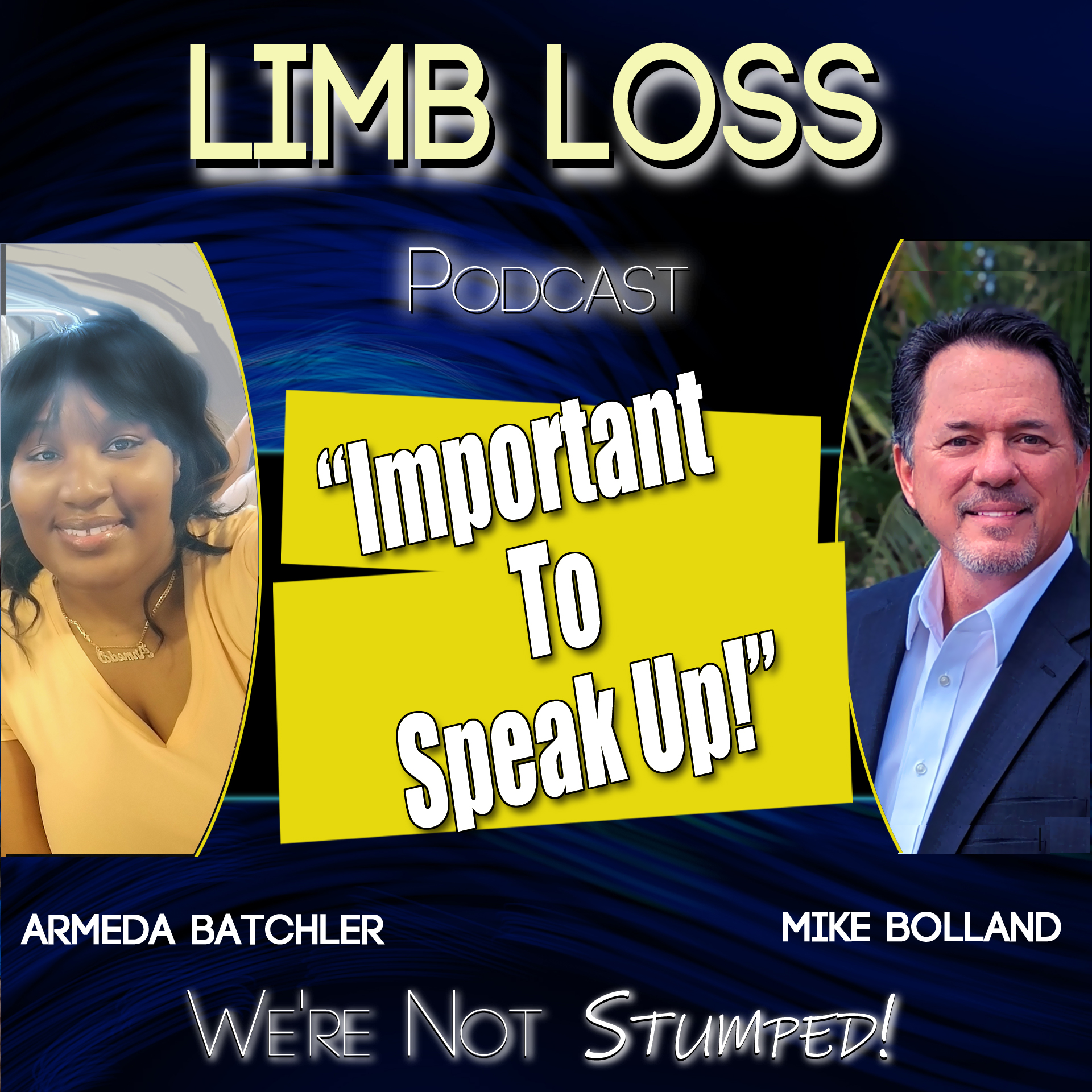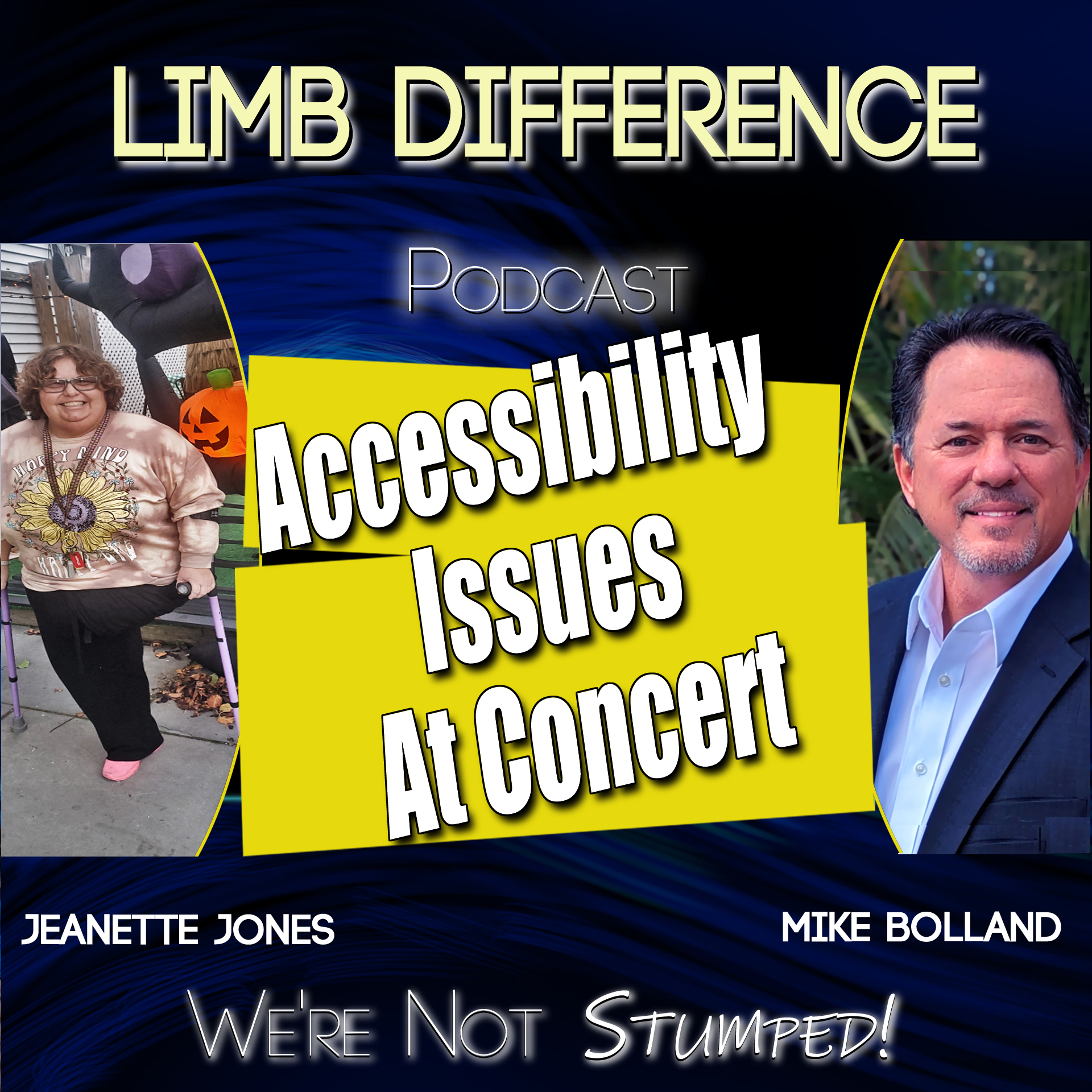Limb Loss Due To Medical Condition Podcast
Don’t Just Exist, Live | Neomi Flores’ Powerful Amputee Journey
In this episode of We’re Not Stumped, host Mike Bolland speaks with Neomi Flores, who became an amputee at age 43 after a blood clot changed her life forever. Neomi shares her powerful journey, including: The frightening symptoms that led to her amputation Facing fear and uncertainty before surgery A year in a wheelchair and the challenges of recovery Learning to walk again with prosthetics Drawing strength from her faith, her children, and small victories The meaning behind her tattoo: “Don’t just exist, live” Her story is one of resilience, gratitude, and determination—a reminder that even in life’s toughest moments, it’s possible to find purpose and live fully.
Resilience After Amputation | Armeda Batchler’s Journey from Cancer to Advocacy
In 2013, Armeda Batchler made the life-altering decision to amputate her left leg above the knee after being diagnosed with osteosarcoma—just months after becoming a new mother. Determined to push forward, she balanced recovery, parenting, and work with remarkable strength. Yet behind the resilience, Armeda faced hidden struggles: depression, isolation, and the difficulty of asking for help. Over time, she discovered the healing power of connection, rebuilding a local amputee support group and embracing advocacy to support others walking a similar path. In this heartfelt conversation, Armeda opens up about her cancer journey, the challenges of raising her daughter while adapting to limb loss, and how hope and community helped her transform struggle into purpose.
Def Leppard Concert: Jeanette Jones on Accessibility Fails
Jeanette Jones returns to the We’re Not Stumped podcast with host Mike Bolland for a powerful conversation that goes beyond music. She shares a shocking and emotional story about the accessibility barriers she and her partner Frank encountered at a Def Leppard concert at the Bethel Woods Center for the Arts. From steep hills to discriminatory treatment by staff, their experience sheds light on how accessibility still falls short—even in 2025. But that’s just the beginning. Jeanette also opens up about her own journey—surviving childhood cancer, transitioning from prosthetics to a wheelchair, and the incredible resilience of her partner Frank after his life-changing accident. This episode is about more than one bad night—it’s a call to action for accessibility, empathy, and real change.
Amputee’s Inspiring Recovery After Tragic Car Accident
In this powerful episode of We’re Not Stumped, host Mike Bolland sits down with Eric Ford to talk about the car accident that changed the course of his life. In 2009, while driving through Atlanta with his children, Eric was struck by a drunk driver. Though his children escaped with only minor injuries, Eric was left with life-threatening damage to his leg. Over the next two months, Eric endured 12–13 surgeries, including skin and muscle grafts, in an attempt to save the leg. When the wound continued to reopen and the pain became unbearable, he made the courageous decision to undergo an amputation. Eric shares the emotional and physical challenges of that decision, and how it ultimately gave him a new lease on life.
One Hand, Many Strengths: Stevia Walker on Advocacy and Dallas Amputee Network
Stevia Walker joins host Mike Bolland to share her powerful story of resilience after a life-altering car accident that left her with a fused cervical spine and Complex Regional Pain Syndrome (CRPS) in her right hand. After extensive research and consultations, Stevia made the courageous decision to undergo amputation of her hand—with the support of Dr. Stephen Niedermeyer. In this inspiring episode, Stevia reflects on rebuilding her life, from her former career as a hair stylist to her meaningful role today as a Girl Scout leader. She speaks candidly about living with phantom limb pain, her challenges with prosthetics, and how she empowers others by sharing her experiences. As a board member of the Dallas Amputee Network (DAN - https://dallasamputeenetwork.org/), Stevia highlights the nonprofit’s impactful work supporting amputees, caregivers, and families throughout North Texas. Founded in 2002, DAN provides education, peer mentorship, fitness opportunities, and social events like the upcoming Legapalooza fundraiser—all aimed at improving the quality of life for those affected by limb loss.
Double Amputee Tom Jalinski Takes on 1,200-Mile Hike to Inspire
Tom Jalinski, a double amputee from Littleton, is taking on a monumental challenge—hiking all 1,200 miles of Wisconsin’s Ice Age National Scenic Trail. In this episode, Tom shares his inspiring journey, from his past as an avid climber to the rigorous training he’s undergone to prepare for this six-month trek. He discusses the physical and mental challenges amputees face, his goal of raising awareness about life after limb loss, and the message he hopes to send to both the amputee and able-bodied communities. With a crowdfunding campaign to support his journey and a determination to prove that physical limitations don’t define one’s potential, Tom’s story is one of resilience, advocacy, and unwavering spirit. Tune in to hear how he’s turning obstacles into opportunities—one step at a time.
About Limb Loss Due To Medical Condition
Limb loss due to a medical condition refers to the loss of one or more limbs (such as arms or legs) as a result of a medical condition or disease. Unlike traumatic limb loss, which often occurs due to accidents or injuries, medical conditions leading to limb loss are typically caused by underlying health issues that necessitate surgical amputation to improve the individual’s overall health, prevent complications, or enhance their quality of life. Some common medical conditions that can lead to limb loss include:
- Peripheral Arterial Disease (PAD): PAD is a condition characterized by the narrowing or blockage of arteries, usually in the legs, due to atherosclerosis. Severe cases of PAD can lead to insufficient blood flow to the extremities, resulting in tissue damage and the need for amputation.
- Diabetes: Diabetes can lead to a range of complications, including peripheral neuropathy and poor circulation. Diabetic foot ulcers that do not heal properly can become infected and, in severe cases, necessitate amputation.
- Cancer: In some cases, cancerous tumors or sarcomas in the limbs may require surgical removal, resulting in limb loss. This is often done to prevent the spread of cancer to other parts of the body.
- Infections: Severe, uncontrollable infections, such as necrotizing fasciitis or gangrene, can cause extensive tissue damage and may require amputation to prevent the spread of infection to other areas of the body.
- Vascular Diseases: Various vascular diseases, such as Buerger’s disease or thromboangiitis obliterans, can lead to arterial inflammation and blockages, ultimately leading to limb ischemia and amputation.
- Congenital Conditions: Some individuals are born with congenital conditions that affect limb development or function, and in certain cases, amputation may be necessary to improve mobility or address complications.
- Complications of Orthopedic Conditions: Chronic orthopedic conditions, such as severe osteomyelitis (bone infection), extensive osteoarthritis, or Charcot joint disease, can lead to joint destruction or bone deterioration, sometimes requiring limb amputation.
Limb loss due to a medical condition is typically a medically necessary intervention aimed at preserving the individual’s overall health and preventing further complications. After amputation, individuals often undergo rehabilitation, including physical therapy, occupational therapy, and prosthetic fitting, to regain mobility, adapt to their new circumstances, and improve their quality of life. The medical team, including surgeons, prosthetists, and therapists, works together to ensure a comprehensive and personalized approach to care for individuals who have experienced limb loss due to a medical condition.






